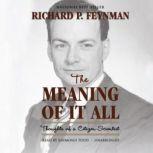
Details
Free Will
Author: Sam Harris
Narrator: Sam Harris
Unabridged: 1 hr 14 min
Format: Digital Audiobook
Publisher: Simon & Schuster Audio
Published: 03/06/2012
Synopsis
The physiologist Benjamin Libet famously demonstrated that activity in the brain's motor regions can be detected some 300 milliseconds before a person feels that he has decided to move. Another lab recently used fMRI data to show that some 'conscious' decisions can be predicted up to 10 seconds before they enter awareness (long before the preparatory motor activity detected by Libet). Clearly, findings of this kind are difficult to reconcile with the sense that one is the conscious source of one's actions. The question of free will is no mere curio of philosophy seminars. A belief in free will underwrites both the religious notion of 'sin' and our enduring commitment to retributive justice. The Supreme Court has called free will a 'universal and persistent' foundation for our system of law, distinct from 'a deterministic view of human conduct that is inconsistent with the underlying precepts of our criminal justice system' (United States v. Grayson, 1978). Any scientific developments that threatened our notion of free will would seem to put the ethics of punishing people for their bad behavior in question. The great worry is that any honest discussion of the underlying causes of human behavior seems to erode the notion of moral responsibility. If we view people as neuronal weather patterns, how can we coherently speak about morality? And if we remain committed to seeing people as people, some who can be reasoned with and some who cannot, it seems that we must find some notion of personal responsibility that fits the facts. And yet the facts don't support the idea that we are the authors of our own actions.We are conscious of only a tiny fraction of the information that our brains process in each moment. While we continually notice changes in our experience'in thought, mood, perception, behavior, etc.'we are utterly unaware of the neural events that produce these changes. In fact, by merely glancing at your face or listening to your tone of voice, others are often more aware of your internal states and motivations than you are. The problem is that no account of causality leaves room for free will'thoughts, moods, and desires of every sort simply spring into view'and move us, or fail to move us, for reasons that are, from a subjective point of view, perfectly inscrutable. Why did I use the term 'inscrutable' in the previous sentence? I must confess that I do not know. Was I free to do otherwise? What could such a claim possibly mean? Why, after all, didn't the word 'opaque' come to mind? Well, it just didn't'and now that it vies for a place on the page, I find that I am still partial to my original choice. Am I free with respect to this preference? Am I free to feel that 'opaque' is the better word, when I just do not feel that it is the better word? Am I free to change my mind? Of course not. It can only change me. There is a distinction between voluntary and involuntary actions, of course, but it does nothing to support the common idea of free will (nor does it depend upon it). The former are associated with felt intentions (desires, goals, expectations, etc.) while the latter are not. All of the conventional distinctions we like to make between degrees of intent'from the bizarre neurological complaint of alien hand syndrome to the premeditated actions of a sniper'can be maintained: for they simply describe what else was arising in the mind at the time an action occurred. A voluntary action is accompanied by the felt intention to carry it out, while an involuntary action isn't. Where our intentions themselves come from, however, and what determines their character in every instant, remains perfectly mysterious in subjective terms. Our sense of free will arises from a failure to appreciate this fact: we do not know what we will intend to do until the intention itself arises. To see this is to realize that you are not the author of your thoughts and actions in the way that people generally suppose. This insight does not make social and political freedom any less important, however. The freedom to do what one intends, and not to do otherwise, is no less valuable than it ever was.
by Terence McKenna
A talk by Terence McKenna about how our global culture is preparing to depart for the stars, so we must begin to pack for the trip. He begins with a discussion of botanical dimensions of folk medicine which are lost in pharmacology, and how this is ...
Published: 01/01/2017
by Jennan Ismael
What is time? What does it mean for time to pass? Is it possible to travel in time? What is the difference between the past and future? Until the work of Newton, these questions were purely topics of philosophical speculation. Since then we've learn...
Published: 01/02/2022
by Robert Hand
Robert Hand was known in his early career as the first practicing astrologer to write astrology programs for microcomputers (in 1977) so that the benefits of computers would be available to astrologers. From this effort, he founded Astro-Graphics Se...
Published: 01/01/2017
by Edward O. Wilson
Asserting that religious creeds and philosophical questions can be reduced to purely genetic and evolutionary components, and that the human body and mind have a physical base obedient to the laws of physics and chemistry, Genesis demonstrates that ...
Published: 03/19/2019
by Richard Feynman
In this collection of lectures Feynman originally gave in 1963, the Nobel Prizewinning physicist discusses several mega questions of science. Marked by Feynman's characteristic combination of rationality and humor, these lectures provide an intimate...
Published: 01/01/2006
by Michael Sanders
What if somebody told that your day-to-day conversations could immediately improve every relationship in your life?In this audiobook, you’ll discover one of the most valuable (yet surprisingly little-known) ways to sharpen your communication s...
Published: 12/20/2020
by Terence McKenna
Feeding back to the psychedelic community of Los Angeles, Terence McKenna delivers an hour of colorful and astounding visual transformations. He weaves a galactic tapestry of art-tickled articulations of the history and future of psychedelic alchem...
Published: 01/01/2017
by Terence McKenna
Feeding back to the psychedelic community of Los Angeles, Terence McKenna delivers an hour of colorful and astounding visual transformations. He weaves a galactic tapestry of art-tickled articulations of the history and future of psychedelic alchem...
Published: 01/01/2017
by Terence McKenna
In these tapes, Terence McKenna brings his considerable talents to bear on the problems of the global delemma, the melt-down of the values of western civilization and the future on the human species. McKenna calls for an "archaic revival" and a diss...
Published: 01/01/2017









